If you don’t examine your own thoughts too clearly, it’s very easy to end up in a situation where you think that just because you prefer something, you are somehow automatically entitled to it. After all, the internet is littered with tales of folks who decided to make requests about things they have no business touching.
A woman asked the internet for advice when her friend demanded that she change her cat’s name, as it turns out he gave his newborn the same name and thought this wasn’t an acceptable option. Commenters shared their thoughts both on her situation and the demands of this so-called “friend.”
Some people give their pets “human” names

Image credits: Helena Lopes (not the actual photo)
But one woman was surprised when her friend asked her to change the name of the cat she had for years



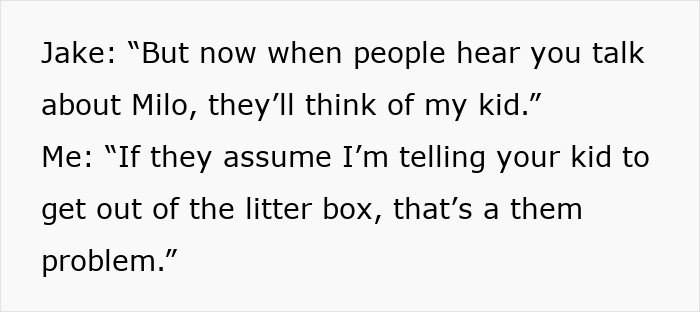
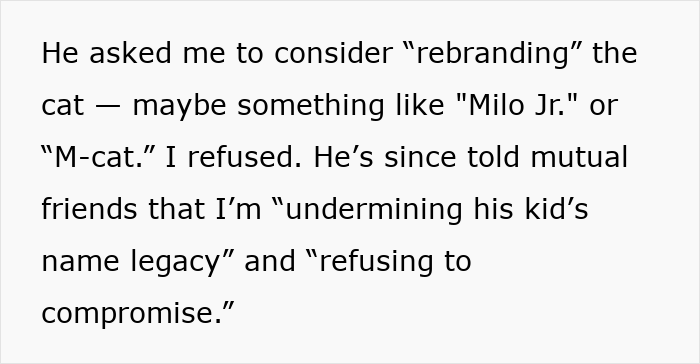

Image credits: Getty Images (not the actual photo)
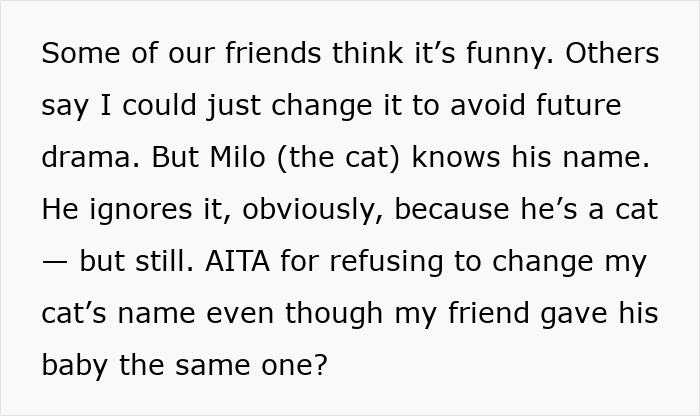
Image source: National-Extreme-391
People who think they are entitled to something must be handled with care
Dealing with entitled people is complicated, as they tend to have a loose grip on reality. Being firm and unrelenting is often the way to go, but what should someone do when the “entitled person” is a friend? A misplaced sense of entitlement will typically appear when someone anticipates special favors or privileges without regard for your feelings or situation. They may insist on getting favors at inconvenient times, make you cancel your plans to assist them, or always expect you to cater to their needs. At first, you write it off as forgetfulness or failure to plan, but when it is a trend, it is a sign of something more profound.
They may have learned in other contexts that pushing boundaries yields some sort of results, and they bring that expectation into your friendship without realizing the strain it causes. Recognizing this helps frame their behavior not as pure malice but as a misguided attempt to fill an internal gap. In this case, “Jake” probably thinks of his newborn as considerably more important than a cat. This is a perspective from his position as a father, but it is valid. So it’s possible to see where his mind “stretches” reality to make his request seem “reasonable,” even when it’s not.
Another one is a lack of awareness, in other words, they simply don’t see the effect their requests have on you. If you’ve been a yes-person consistently, they may never even question whether their demands are too much. The dynamic can become self-perpetuating: your compliance habituates them to keep making more requests. Meanwhile, you may be guiltily or anxious not to say no because you’re fearful of creating boundaries that will kill the friendship. Unchecked entitlement kills deep connection quicker than honest boundaries, however.
There are a few things people can do to “manage” friends that behave like this
Managing a friend’s expectations starts with being aware of your own limits and putting value on your own well-being. Reflect on whose requests actually demand more of you than is fair to offer. Is it the time, funds, or effective labor? Naming this enables you to respond in an assertive, rather than reactive, manner. Remember that a no to a single request does not make you a horrible friend, it makes you a thoughtful friend who honors your own needs as well as the substance of the relationship.
Second, talk assertively but respectfully. Choose a calm moment to inform them how some of the demands affect you. Don’t label them as “entitled.” Mention particular examples: “I felt overwhelmed when asked to drive you home last-minute after a whole day of work.” Use “I” statements to make it about your experience rather than blaming. This strategy reduces defensiveness and makes space for discussion. An actual friend may never realize the impact of their actions until you kindly point it out with empathy.
Offer alternatives where you can. Some comments suggested, rather comically, to refer to the child as “human Milo,” although this does seem like it could cause more confusion. It’s also worth noting that it’s strange for “Jake” to assume there will be a plethora of situations where the cat-owner will be referencing Milo and random people will assume it’s his child.
The reality is that things can get complicated quickly
Setting that aside, if you want to keep the friendship but also not bow to their demands, there are going to be some difficulties. First of all, expect resistance. An entitled friend will most likely become defensive, claim that you’re being unsupportive, or try to guilt-trip you. Stay firm on your reasons and reiterate your boundaries in a casual way. If they insist that you did more for them previously, thank them for past help but clarify that things are different now.
Watch how they react with time. An open-to-grow friend will say sorry, adjust expectations, and try their hardest to pay it forward. They might check in: “How can I better serve you?” and respect your boundaries. If they instead persist in pushing or disregarding your needs, that is a sign of relationship out-of-balance. Ask yourself whether this friendship is enriching your life.
Quitting or stepping back from toxic dynamics is hard, but keeping your sanity tends to mean letting go of the drainers not the uplifters. Finally, build respect-based friendships. Reflect upon how you interact with others: don’t place unrealistic expectations on friends yourself. Engage in good behavior by asking first before asking for favors, being appreciative when people assist you, and paying it forward. Surrounding yourself with people who respect boundaries creates a positive cycle: you become better at recognizing entitlement earlier and maintaining relationships where care is reciprocal. In the end, maintaining misplaced entitlement in the friend is less about saying no and more about establishing a culture of respect, honesty, and reciprocity that facilitates true connections.
Most thought her friend was out of his mind


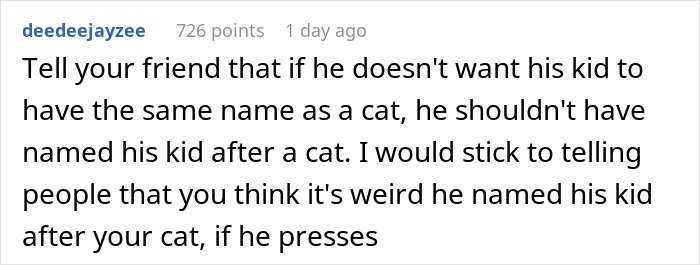

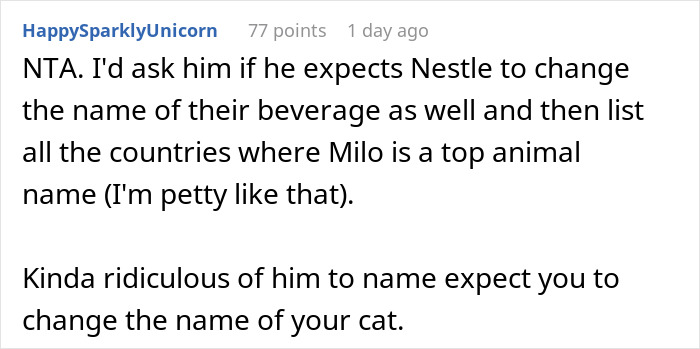

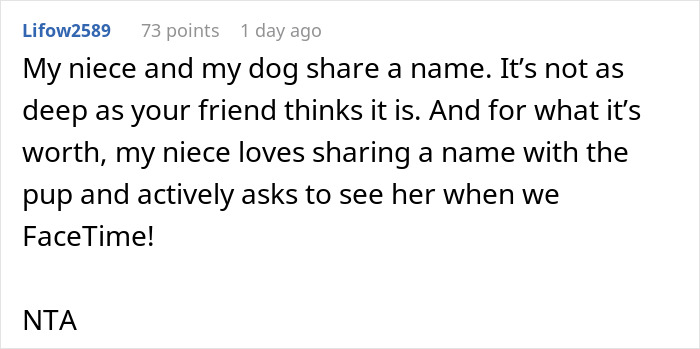









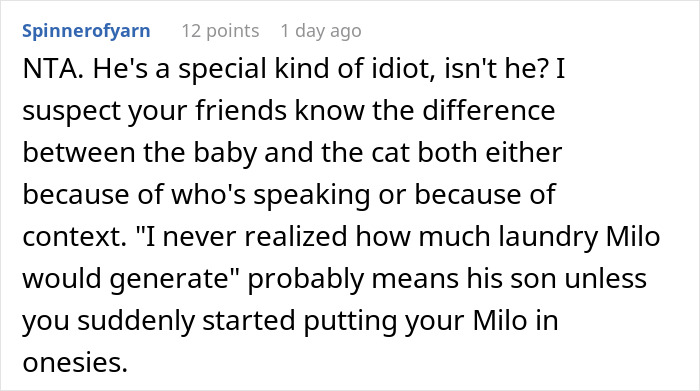










from Bored Panda https://ift.tt/PSAgvf4
via IFTTT source site : boredpanda